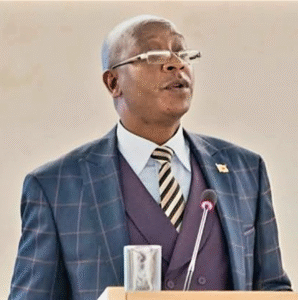Wicknell Chivayo’s Alarming Influence Over Zimbabwean Politics

In a striking revelation on June 10, 2018, President Emmerson Mnangagwa expressed his concerns about controversial businessman Wicknell Chivayo, hinting that Chivayo was a prime candidate for incarceration at Chikurubi Maximum Security Prison. This comment, made in Mutoko, Mashonaland East province, was specifically in reference to Chivayo’s involvement in the scandalous US$173 million Gwanda Solar project. Chivayo received a substantial US$5.8 million in advance without initiating any substantial work on the project, highlighting a disturbing inefficiency and possible corruption within the system.
The narrative surrounding Chivayo has taken an even more troubling turn with the emergence of a leaked audio. In this recording, Chivayo boasts about having President Mnangagwa under his control, suggesting a deep-seated corruption that extends beyond individual projects to the core of political and economic systems in Zimbabwe. Chivayo’s claim to have the president in his “dead man’s grip” is a stark illustration of the power dynamics that can pervade national governance.
This situation is compounded by Chivayo’s recent activities, which seem to confirm the worst fears about his influence. After being paid millions from a corrupt US$40 million Zimbabwe Electoral Commission tender—a process shrouded in secrecy and manipulation – Chivayo is now using these funds to extend his reach across the Southern African region, seeking tenders and deals not for investment but for further financial gains.
Chivayo’s words, “ndakachibata kuti dzvii, kuti dzvii…”, which translate to him having tight control of the situation, underscore a brazen confidence in his untouchable status. He openly narrates how his relationship with Mnangagwa has facilitated numerous dubious deals, allowing him a free hand in the nation’s economic matters. This is not just a story of a businessman gone rogue; it’s a chilling account of how deeply political and economic networks in Zimbabwe are intertwined and susceptible to manipulation.
Moreover, Chivayo’s ability to navigate these networks has been demonstrated through various instances, such as his closeness to Vice-Presidents Constantino Chiwenga and Kembo Mohadi, and his significant influence over political narratives. His involvement in funding political campaigns, evidenced by the cars and cash he distributes among ZANU-PF supporters, highlights a strategy designed to buy loyalty and ensure silence or compliance.
This narrative took a personal turn during an incident recounted by Chivayo, where President Mnangagwa allegedly took his hand and invited him to discuss deals while walking him to his flight to Italy for the Italy-Africa Summit. Such instances reveal the casual yet firm integration of Chivayo within the highest circles of power, blurring the lines between legitimate business practices and political patronage.
Chivayo’s influence is a stark reminder of the challenges facing Zimbabwe’s political and economic systems. It raises critical questions about the integrity of state and governmental operations, where individuals like Chivayo operate with seeming impunity. The leaked audio not only exposes the deep-seated corruption but also serves as a wake-up call for greater transparency and accountability in Zimbabwe’s governance.
As Zimbabwe continues to navigate complex political dynamics, the role of individuals like Chivayo will undoubtedly be scrutinized. The revelations from the leaked audio and subsequent developments suggest a need for a thorough examination of how business and politics intertwine in ways that can undermine state integrity and economic development. Such insights are crucial for envisioning a more transparent and accountable governance structure in Zimbabwe.





